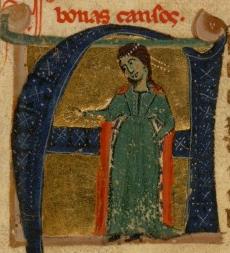Comtessa de Dia: Difference between revisions
From Cunnan
Jump to navigationJump to search
No edit summary |
|||
| (2 intermediate revisions by 2 users not shown) | |||
| Line 1: | Line 1: | ||
[[image:Comtessadedia.jpg|right]] |
|||
| ⚫ | The ''' |
||
| ⚫ | The '''Comtessa de Dia''' was a late [[12th Century]] [[Countess]] of Dia, probably called Beatritz, who is notable as the most prolific of the [[trobairitz]]. Her works, which are considered the equal of any of her male contemporaries, reflect traditional modes of [[courtly love]] from a woman's perspective. In her [[song]]s she claims to long to be in the arms of her love, rather than those of her husband. Only one melody of hers survives, for the song ''A chantar m'er''. |
||
| ⚫ | |||
| ⚫ | |||
[[Category:Troubadour]] |
[[Category:Troubadour]] |
||
Latest revision as of 10:37, 11 March 2010
The Comtessa de Dia was a late 12th Century Countess of Dia, probably called Beatritz, who is notable as the most prolific of the trobairitz. Her works, which are considered the equal of any of her male contemporaries, reflect traditional modes of courtly love from a woman's perspective. In her songs she claims to long to be in the arms of her love, rather than those of her husband. Only one melody of hers survives, for the song A chantar m'er.
According to her vida she was married to Lord William of Peitieus, but fell in love with the troubadour Raimbau d'Aurenga and wrote him many songs.
